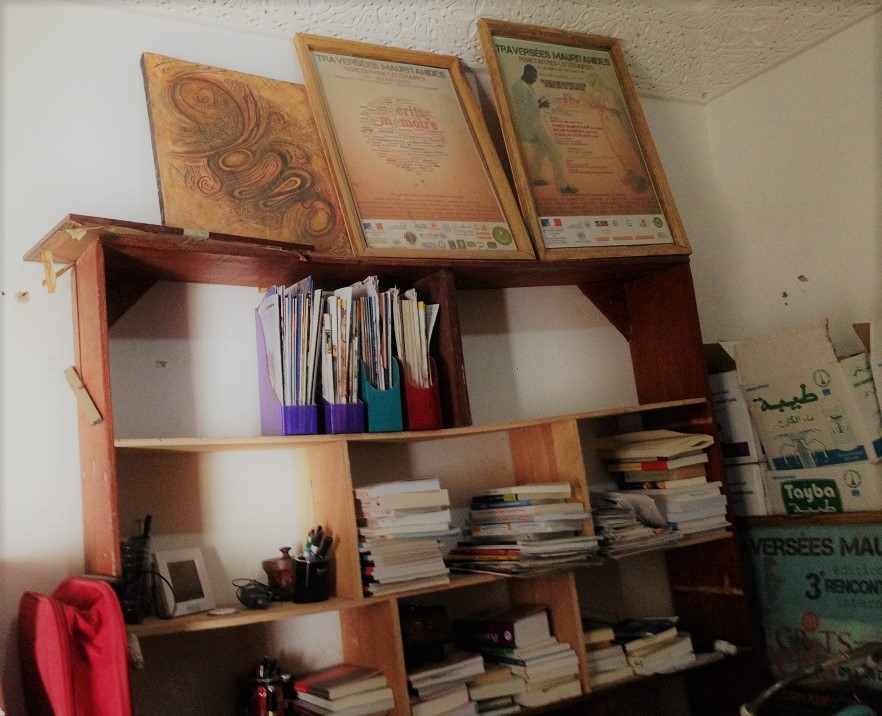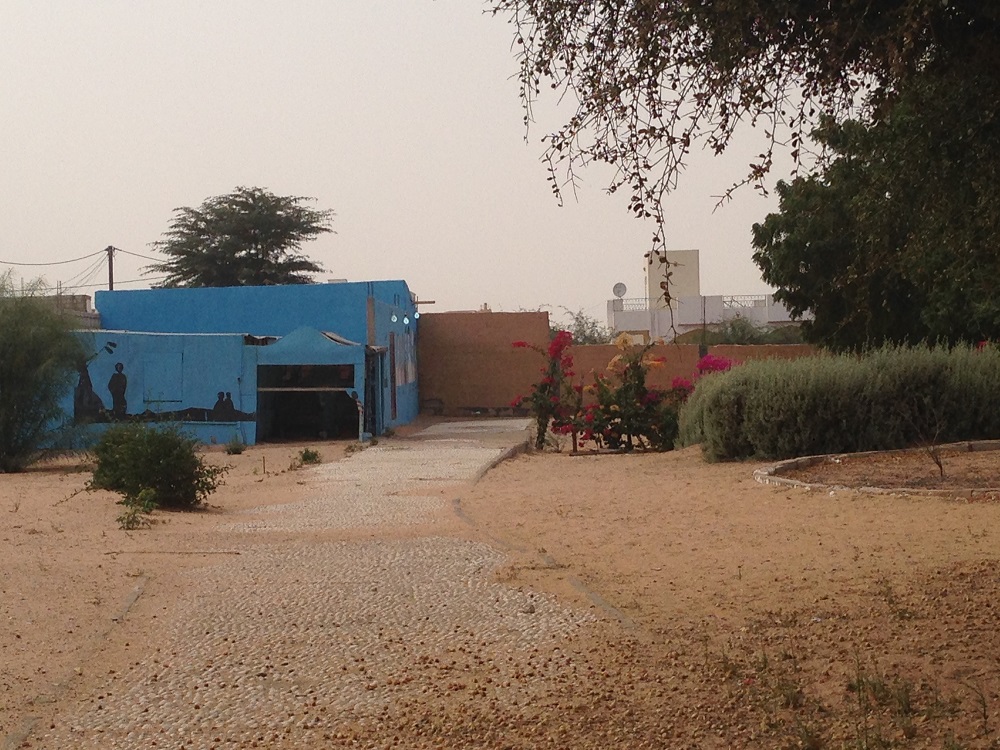Mohamed Bouya Bamba is a former Fulbright scholar and a novelist. Bamba studied translation studies at Kent State University and, in 2011, published his first novel online under the title “Angels of Mauritania and the curse of the language.” He is now working on his second novel.
This post is part of a MULOSIGE series in response to the recent publication of a special issue of the Journal of African Cultural Studies entitled ‘Contemporary Conversations: Is English an African Language?’ In particular, this series responds to a pair of articles – one by the Kenyan scholar and author Ngũgĩ wa Thiong’o, the other by the Nigerian academic Biodun Jeyifo – that take opposing stances on the position of English in African literatures, reigniting the debates between Ngũgĩ and authors such as Chinua Achebe in the 1970s and 1980s. This series is timed to reflect on the SOAS African Literature Conference, which takes place on 28 October 2017. Check out Wanga Gambushe’s post that also responds to the articles by Ngũgĩ and Jeyifo.

Mohamed Bouya Bamba was the first Mauritanian to write a novel in English. Photo courtesy of Bamba.
As an African, I never would have encountered the language advocate and African literary great Ngũgĩ wa Thiong’o were it not for two things: his decision to write in English, and my own decision to study English. When I was completing my undergraduate degree at the University of Nouakchott in 2004, I had the opportunity to take a course titled ‘African Literature,’ where I read Nguigi and Achebe for the first time. The majority of the students liked this course, and it was very different from anything we had studied up to that point. It made us see how English literature could be African literature. What is more, I saw the usefulness of English for interethnic communication within my own country. Mauritania, like most of the continent’s countries, is ethnically and linguistically diverse. As I wrote about in my novel, there is also a history of racial and ethnic conflict which plays out in people’s feelings about language. In the English Department at the University of Nouakchott, we all spoke English together and so we felt like we were on equal footing. After learning English, students discovered the richness of the other Mauritanian cultures- something that was almost impossible through communicating in Hassaniya (our Arabic dialect, which Black Mauritanians associate with racism) or French (which Arabs consider the colonial language). It was very surprising to see a research group made up of all the ethnic groups presenting in English and, in fact, this was virtually unheard of in other departments. English played a vital role in helping Mauritanian ethnic groups embrace each other and form long-lasting friendships and an overall sense of brotherhood.
Reading this wave of African writers drew my attention to a specific kind of Africanness that I often disagreed with, or at least thought was outdated. They equated Africanness with Blackness and with resistance to colonial powers. Not all Africans are Black, and there are plenty of examples where Black Africans aided the colonial powers for personal gain. It was very contradictory, as it is the colonial and imperial powers that promoted writers such as Ngũgĩ and the majority of their readership is not in Africa. It is difficult for me to believe that they are resisting colonial and imperial powers. There is no doubt that Ngũgĩ wa Thiong’o and other language activists are gifted writers that I benefited from reading, but their debate over language still reinforced what they are resisting. They continue to write in English and to work for universities that get their money from former imperial powers. What English as a neutral language has done for the continent is much more than what their language activism has accomplished. Writing in an ‘African language’ does nothing to promote communication or knowledge production on the continent- it only limits our audience and, in many cases, advantages one ethnolinguistic group over another. Arguing that English is inherently oppressive is much easier for Africans who are not dominated by other African ethnic groups or castes. Finally, most Africans are too busy trying to communicate in whatever language will be effective in bettering their lives to care about an arcane academic debate.

A personal library in Nouakchott, Mauritania. Photo by July Blalack.
After graduation, I began to think more about the role of English. Was what I studied less African because it was written in English? What is African about this type of literature? Is it the language it is written in? Is it the people who wrote it? Is it its subject matter? Why is this assumed to be more important than the audience this literature is written for? I especially started thinking about these issues in regards to writing a novel, which had long been my dream.
If I had written the novel in my mother tongue, Hassaniya Arabic, my readership would be limited to maybe half of the population of my country. If I wrote in Standard Arabic, my readership would be larger, but it would not reach as many people on the continent. Luckily, I spoke and wrote in English, so I went ahead and drafted my novel Angels of Mauritania and the Curse of the Language in English and published it online. A year later, the writer Ann Morgan decided to ‘read the world’ and was stuck when she got to Mauritania. Although there are great Mauritanian novelists, they all wrote either in French or Arabic. However, she found my work through an Internet search, and thus Mauritania was featured on her award-winning blog. Had I written in Arabic or French, I wouldn’t have been able to represent Mauritania in all our complexity and diversity- including, ironically, our language problems. It is true that I could reach a lot of other Africans by writing in French, but French is a colonial language as much as English is- the only difference is that the relevance of French around the world, including in Africa, is declining.

The ‘Center for Cultural and Natural Diversity’ in downtown Nouakchott is one of the few sites in the city devoted to cultural and literary events. Photo by July Blalack.
English is uniquely African in many ways. It has served as a language of pacification, a language of opportunity, and a language of academic debate over issues that impact the continent. In addition to being a language of pacification, English is widely viewed in Mauritania as a language of opportunity. The majority of English Language and Literature graduates can get jobs more easily with multinational companies, while graduates from other departments struggle to make to the job market. English also allows graduates to be easily trained in various fields apart from what they studied. How can we insist that African youth not learn this language and thus isolate themselves from the rest of the world, including people within the continent and within their own countries? Wouldn’t a better approach be the preserve our mother tongues while also embracing English?
Regardless of whether English is labeled the colonial language, the global hegemonic language, or an African language, English is already becoming the language of the African continent as we speak. African curricula are changing to accommodate the importance of English for the continent in all aspects, for example Rwanda made the switch from French-based education system to an English-based one in 2008 [1]. An African traveler moving through the continent would use English to communicate more than any other language, and the same thing goes for a writer who wants to get access to a larger audience, be it on the continent or otherwise. Very few Africans can afford to take an extreme ideological stance and distance themselves from the use of English, so why do we not instead make this language our own and shape it for our own purposes?
[1] See: https://www.theguardian.com/world/2008/oct/14/rwanda-france
This post responds to recent articles in the Journal of African Cultural Studies:
- Mugane, J.: ‘Contemporary Conversations: is English an African language?‘ (2017).
- Ngũgĩ wa Thiong’o: ‘The politics of translation: notes towards an African language policy‘ (2017).
- Jeyifo, B.: ‘English is an African language – Ka Dupe! [for and against Ngũgĩ]‘ (2017)
The debate surrounding the use of English by writers of African literatures goes back to at least the 1960s. Prominent contributions to this debate include:
- Achebe, C.: ‘English and the African Writer‘ in Transition 18 (1965): 27-30.
- Ngũgĩ wa Thiong’o: Decolonising the mind: the politics of language in African literature (Heinemann Educational, 1986).


The claim that “English language has played a vital role in helping mauritanian ethnic groups embrace each other and create sense of brotherhood” seems to be exaggerated. It is perfectly true that Using common foreign language by itself does not logically entail tolerance. It also rules out the possibility that mauritanian ethnic groups could live together without common imperial language.
Although empirial languages has more audience than African languages, that does not mean indigenous languages has nothing to promote knowledge production. Would the fact that one language has more Audience be sufficient justification for it’s use, while losing another one?